Why Do You Love the Science Fiction You Love?
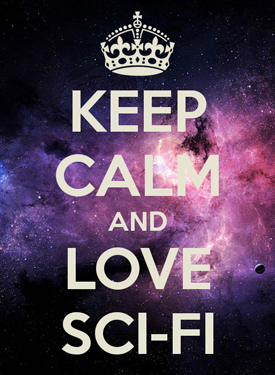 Science fiction has always been more than adventure stories for me. Science fiction is my Aristotle and Augustine, giving meaning to our meaningless reality. When you recall the science fiction tales that meant the most to you, were they thrill rides? Or maps of speculation? I use science to statistically explain how reality works, but I use science fiction to speculate how we can manipulate reality. That was when I was young. Now that I’m older, I use science fiction to imagine how things might play out on Earth after I leave.
Science fiction has always been more than adventure stories for me. Science fiction is my Aristotle and Augustine, giving meaning to our meaningless reality. When you recall the science fiction tales that meant the most to you, were they thrill rides? Or maps of speculation? I use science to statistically explain how reality works, but I use science fiction to speculate how we can manipulate reality. That was when I was young. Now that I’m older, I use science fiction to imagine how things might play out on Earth after I leave.
I’ve often wondered why science fiction is my chosen literature. Why do we pick the things we love? Is it free will, or some kind of adaptation or instinct? If a super-AI studied my habits like human scientists study chimps, what would it make of my choices in literature? Do aspects of my personality explain why I was drawn to science fiction?
Over at the Classic Science Fiction book club, we’ve been discussing our personal top ten favorite science fiction stories. What surprised me was the diversity of titles we embraced. Many of the stories are not on my Classics of Science Fiction, a list of the statistically most remembered science fiction books. You can see what stories members picked listed here. This made me wonder why we love the science fiction stories we do. The picks are as individualistic as fingerprints. There’s been some discussion at the group about all of this, but it inspired me to write this essay. Are we attracted to objectively great books, or do we seek books that mirror our subjective selves?
Sometimes I feel there’s no such thing as a great book, at least not in a measurable sense. The books we think are great are merely the ones that reflect our strongest desires. They don’t need to be well written, brilliant, or literary. They just need to trigger emotions. With me it might be accidental that they are science fiction. Or, are science fiction fans the kind of people drawn to the fantastic? Is mundane reality too tame for our ordinary lives?
Here are the ten titles I sent the book club. The list might be different on another day, or maybe not. These are the books I reread. These are the books I keep writing about. (Title links in the list go to WWEnd pages, title links in the essay are to older essays.)
- Have Space Suit-Will Travel by Robert A. Heinlein (1958)
- “The Star Pit” by Samuel R. Delany (1967)
- Tunnel in the Sky by Robert A. Heinlein (1955)
- Earth Abides by George R. Stewart (1949)
- Time for the Stars by Robert A. Heinlein (1956)
- Empire Star by Samuel R. Delany (1966)
- Confessions of a Crap Artist by Philip K. Dick (1959)
- The Man in the High Castle by Philip K. Dick (1962)
- The Time Machine by H. G. Wells (1895)
- The Door Into Summer by Robert A. Heinlein (1957)
My favorite science fiction is 50 years or older, and written by men. Is this list a Rorschach test for my personality? I do love modern science fiction, and often think it better written and more sophisticated than my favorites here. And I do prefer the diversity of modern SF. Yet, these are the stories burned in my memory. I read most of these stories before I turned 20. It might be our life-time favorites are the books we read in youth. First impressions are often the lasting impressions.
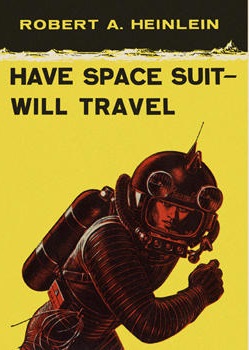 I first read Have Space Suit-Will Travel during the 1964-65 school year, at the dawn of Project Gemini. I was in the 8th grade and dying to blast off into space – just like Kip, the main character. I wished I was like Kip in many ways, but I wasn’t. I wanted to work hard in school, have my own science workshop, and live in a stable happy family located in a small town. None of those were true for me. I’ve read Have Space Suit-Will Travel six or eight times. It is the definitive science fiction novel for me. Back then it was my road map of the future, now it’s the tintype of my nostalgic past. For some baby boomers growing up in the 1950s and 1960s, the Heinlein juveniles were our substitute for religion. Those twelve books gave us faith, not in a sacred heaven, but in a secular outer space.
I first read Have Space Suit-Will Travel during the 1964-65 school year, at the dawn of Project Gemini. I was in the 8th grade and dying to blast off into space – just like Kip, the main character. I wished I was like Kip in many ways, but I wasn’t. I wanted to work hard in school, have my own science workshop, and live in a stable happy family located in a small town. None of those were true for me. I’ve read Have Space Suit-Will Travel six or eight times. It is the definitive science fiction novel for me. Back then it was my road map of the future, now it’s the tintype of my nostalgic past. For some baby boomers growing up in the 1950s and 1960s, the Heinlein juveniles were our substitute for religion. Those twelve books gave us faith, not in a sacred heaven, but in a secular outer space.
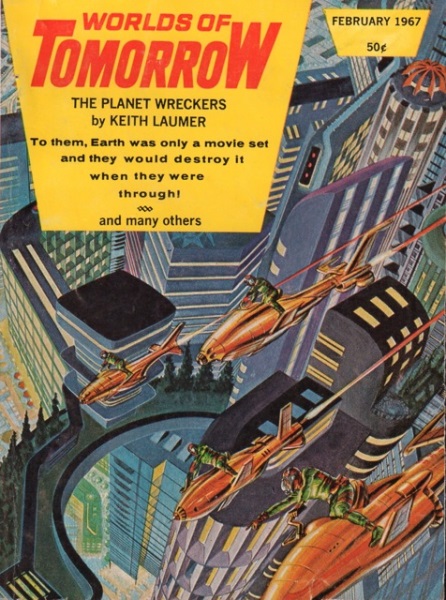 “The Star Pit” is also about the relentless desire to go into space, but ultimately deals with the limitations that hold us back. I first read this story in 1968, when I was slightly older and knew I wasn’t going into space. “The Star Pit” is tattooed on my heart, and whenever I reread it, the story squeezes tears out of my eyes, like beautiful songs of heartbreak. It might be the most mature of the ten stories I list here, even though it was written by the youngest writer at the time. The main character and my father were alcoholics who always had the restless urge to run away. I was Ratlit, and I wished my father had been the older Vyme. This story could easily have been a mainstream literary work without science fictional elements. I imagine its based on Delany’s own experiences, and he knew he wasn’t going into space too.
“The Star Pit” is also about the relentless desire to go into space, but ultimately deals with the limitations that hold us back. I first read this story in 1968, when I was slightly older and knew I wasn’t going into space. “The Star Pit” is tattooed on my heart, and whenever I reread it, the story squeezes tears out of my eyes, like beautiful songs of heartbreak. It might be the most mature of the ten stories I list here, even though it was written by the youngest writer at the time. The main character and my father were alcoholics who always had the restless urge to run away. I was Ratlit, and I wished my father had been the older Vyme. This story could easily have been a mainstream literary work without science fictional elements. I imagine its based on Delany’s own experiences, and he knew he wasn’t going into space too.
I read Tunnel in the Sky and Time for the Stars during the same school year as Have Space Suit-Will Travel. Both were about boys who left their families to be on their own. My parents’ marriage was a train wreck, and I wished I could have divorced them. I grew up loving stranded on deserted island stories, and Tunnel was a science fiction version of one. I believe the reason I was so attracted to the Heinlein juveniles is because their teen heroes always found ways to leave their parents.
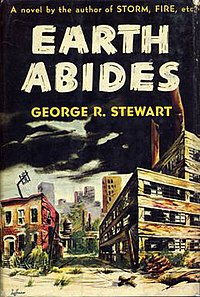 Earth Abides also belongs to one of my favorite kinds of stories – last man on Earth stories. There is a side of me that wishes I was the last man on Earth. I love the idea of starting civilization over with a few other people or even being the last person watching nature reclaim the planet. I’ve always been kind of a loner even though I’ve been married for 38 years and have many friends. My childhood would have crushed most children, but I survived by dreaming, especially science fiction dreams.
Earth Abides also belongs to one of my favorite kinds of stories – last man on Earth stories. There is a side of me that wishes I was the last man on Earth. I love the idea of starting civilization over with a few other people or even being the last person watching nature reclaim the planet. I’ve always been kind of a loner even though I’ve been married for 38 years and have many friends. My childhood would have crushed most children, but I survived by dreaming, especially science fiction dreams.
Empire Star fits me philosophically. I read it maybe in 1967. Delany was closer to my age, and his work felt radically different from all the older science fiction writers I was discovering. Heinlein was like a father figure, but Delany was like a brother. Empire Star has wise advice for young people going out on their own for the first time. Delany’s insight into simplex, complex and multiplex was the best concept I ever learned from science fiction. I completely identified with both Comet Jo and Ni Ty.
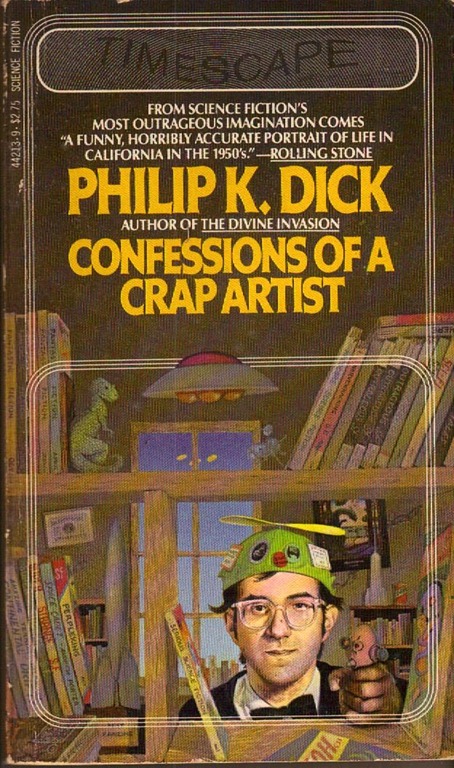 I love Confessions of a Crap Artist because it’s how I remember the 1950s. My uncles were crap artists. I think all science fiction fans have a bit of crap artist in them. I love this novel because it shows we’re all crazy in unique ways. I believe this is PKD’s best book. Confessions is somewhat autobiographical, and one of Dick’s attempts to write literary. I love The Man in the High Castle because it’s about a little guy trying to survive in a very strange reality and make sense of it. How universal is that? PKD was great at writing about powerless people. His wife at the time he wrote these novels, Anne R. Dick, has written a memoir of those years, The Search for Philip K. Dick. To become a Dickhead means falling down the rabbit hole of trying to decipher PKD. I keep rereading his literary novels and his biographies to figure out why he wrote all those bizarrely wonderful novels that resonate with me.
I love Confessions of a Crap Artist because it’s how I remember the 1950s. My uncles were crap artists. I think all science fiction fans have a bit of crap artist in them. I love this novel because it shows we’re all crazy in unique ways. I believe this is PKD’s best book. Confessions is somewhat autobiographical, and one of Dick’s attempts to write literary. I love The Man in the High Castle because it’s about a little guy trying to survive in a very strange reality and make sense of it. How universal is that? PKD was great at writing about powerless people. His wife at the time he wrote these novels, Anne R. Dick, has written a memoir of those years, The Search for Philip K. Dick. To become a Dickhead means falling down the rabbit hole of trying to decipher PKD. I keep rereading his literary novels and his biographies to figure out why he wrote all those bizarrely wonderful novels that resonate with me.
I love The Time Machine because I consider it the archetype of science fiction. The time machine was cool, but not the point. Wells’ speculative explorations were epic. That’s how I define science fiction – as speculation. I love The Time Machine in the same way I love Olaf Stapledon’s majestic speculations. This is what I want from science fiction – to think really big thoughts.
I fell in love with The Door into Summer for two reasons. First, it’s about inventing robots in a home workshop. I always wanted to build robots. Second, Daniel Boone Davis slept his way into the future, and I would love to do that. I wish I could take 50-year naps to see how history progresses.
There are many other science fiction books I love, but for the moment, these are the ten I picked to share with the book club members. Picking ten books is just something fun we did this week, but I think our choices are revealing. Certainly more telling than exchanging astrological signs, maybe with as much validity as a Briggs-Myers test.
If you want to be revealing, list the ten science fiction stories you love most in the comments below.



















 Full Details
Full Details


3 Comments
Hi James
I seem to have too many years/critical baggage to easily give you a current list. So I will give you the list the geek kid in public school, where it all started, would have given. There will be runs by the same author, that was how I started, read one then if you liked it the next.
Space Cadet Heinlein
Between Planets Heinlein both have aliens
X-Factor Norton
Beastmaster Norton
Starman’s Son Norton first 3 have animals
Star Rangers Norton cool aliens and starships
Deep Range Clarke the ocean was big then
The Kraken Wakes Wyndham ocean again
Day of the Triffids Wyndham both have disasters great
Fahrenheit 451 Bradbury because this is still number one on my list today
And looking at this list, these books shaped the science fiction I love to this day.
Regards
Guy
Well, James, my criteria is that have I read and enjoyed the books as an adult and would reread them again. In my youth I’d count Heinlein’s Starman Jones and Ben Bova’s Star Conquerors as my two favorites. I reread Starman Jones in my early 20’s as was surprised at how much of the story that I seemed to remember was missing. And since then, most of the books from that era – the 60’s – that I’ve sampled are not enjoyable today. Truth be told, I needed to look over my library to come up with as close to 10 science fiction books as I did.
My current favorite is Jasper Fforde’s Shades of Grey. I’ve read it perhaps 4 times already. Love it.
A Princess of Mars – Edgar Rice Burroughs (even read it to my kids as a bed time story) & the series
The John Grimes series by A Bertram Chandler
The (original) Amber Series by Roger Zelazny
The Witches of Karres by James H Schmitz
Ossian’s ride by Fred Hoyle
somewhat iffy… (it’s been a long while)
Highways in Hiding by George O Smith
The Star King (Beyond the Moon) by Edmund Hamilton
And… that’s about it for strictly SF.
Off the beaten track I’d add Islandia by Austin Tappen Wright, a strange, wonderful book set in a continent in the South Atlantic, that’s not on the current maps.
And I love the Garrett PI stories by Glen Cook, though it’s more fantasy, of sorts, though it does have UFOs and space aliens.
I love the kind that takes me to a place I know and turns that into the fantasy. I am reading Cinzia de Santis’ book The Guide of Time at the moment and it is set in places I have been and it really takes me back there but in the fantasy. That is what I look for in my reads in this genre.
Sorry, the comment form is closed at this time.